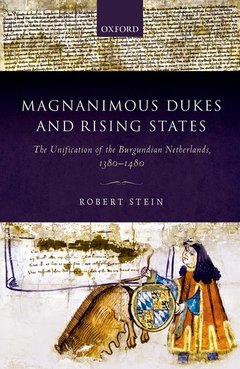Description
Magnanimous Dukes and Rising States
The Unification of the Burgundian Netherlands, 1380-1480
Oxford Studies in Medieval European History Series
Author: Stein Robert
Language: English
Subject for Magnanimous Dukes and Rising States:
Publication date: 03-2017
336 p. · 16x24.1 cm · Hardback
336 p. · 16x24.1 cm · Hardback
Description
/li>Biography
/li>
In the late fourteenth and the fifteenth centuries, the Dukes of Valois-Burgundy created a composite monarchy in the Netherlands, an area that had been dominated for centuries by several regional dynasties. In this way they laid the foundation for the modern states of the Netherlands, Belgium, and Luxemburg. The rise of the House of Burgundy can be read as the success story of a dynasty that in little over a century managed to assemble a great number of principalities, thus creating a new state. The Burgundian takeover, however, resulted in a modernization of administration, jurisdiction, and finances. The process of unification and the character of the union are the central topics of Magnanimous Dukes and Rising States. Robert Stein mirrors continuity and modernisation in Burgundian times with the bankruptcy of the former dynasties and the decline of feudal government. The powerful towns played an important background role; it was only with their support that a unification of the Netherlands was possible, but this support was not unselfish. This study is about the development of power relations and institutions in the field of tension between ruler and subject, between centralisation and particularism.
Robert Stein completed his PhD thesis on Medieval Brabantine Chronicles in the fifteenth century at Leiden University in 1994. After having fulfilled various research positions at Leiden University and the Fryske Akademy, he became Lecturer in Medieval History at Leiden University in 2001. Stein has published extensively on the medieval historiography of the Low Countries and the development of medieval collective identities. His current research focusses on the unification of the Burgundian Netherlands and the related 'culture of accountability'.
© 2024 LAVOISIER S.A.S.

